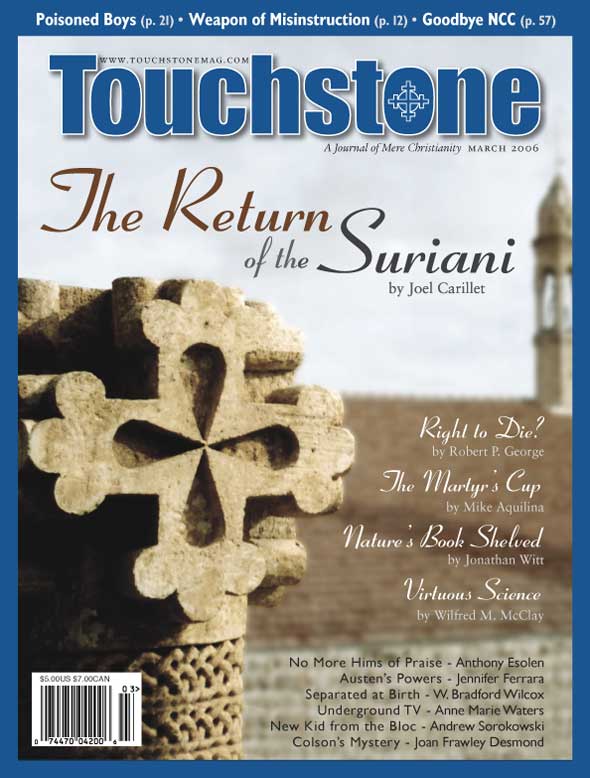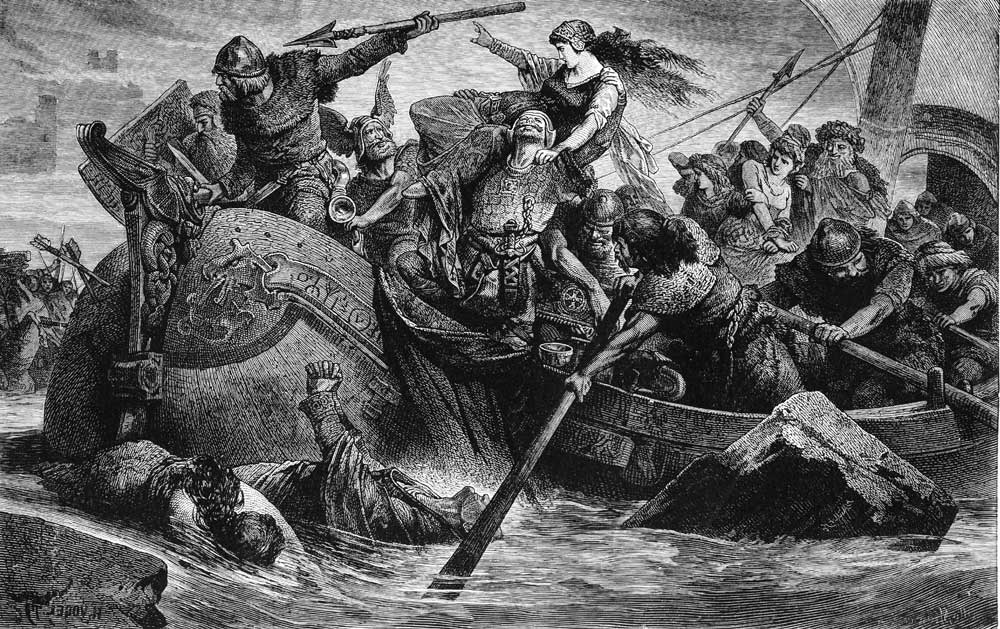Feature
The Martyr’s Cup
The Early Christians Give Us the Signs of the Christian Life:
Broken Bread & Lives Poured Out
In July of A.D. 64, during the tenth year of Nero’s reign, a great fire consumed much of the city of Rome. The fire raged out of control for seven days—and then it started again, mysteriously, a day later. Many in Rome knew that Nero had been eager to do some urban redevelopment. He had a plan that included an opulent golden palace for himself. The problem was that so many buildings were standing in his way—many of them teeming wooden tenements housing Rome’s poor and working class.
Convenient Fire
The fire seemed too convenient for Nero’s purposes—and his delight in watching the blaze didn’t relieve anybody’s suspicions. If he didn’t exactly fiddle while Rome burned, he at least recited his poems. Nero needed a scapegoat, and an upstart religious cult, Jewish in origin and with foreign associations, served his purposes well. Nero, who was a perverse expert at human torment, had some of its members tortured till they were so mad they would confess to any crime. Once they had confessed, he had others arrested.
He must have known, however, that the charges would not hold up. So he condemned them not for arson, or treason, or conspiracy, but for “hatred of humanity.”
To amuse the people, he arranged for their execution to be a spectacle, entertainment on a grand scale. The Roman historian Tacitus (who had contempt for the religion, but greater contempt for Nero) describes in gruesome detail the tortures that took place amid a party in Nero’s gardens.
Mockery of every sort was added to their deaths. Covered with the skins of beasts, they were torn by dogs and perished, or were nailed to crosses, or were doomed to the flames. These served to illuminate the night when daylight failed. Nero had thrown open the gardens for the spectacle, and was exhibiting a show in the circus, while he mingled with the people in the dress of a charioteer or drove about in a chariot. Hence, even for criminals who deserved extreme and exemplary punishment there arose a feeling of compassion; for it was not, as it seemed, for the public good, but to glut one man’s cruelty, that they were being punished.
That is all we know about the first Roman martyrs. We know none of their names. Tacitus doesn’t tell us why they were willing to die this way rather than renounce their faith. Yet this should be an important question for us to consider. Why did the martyrs do this? What prepared them to face death so bravely? To what exactly did they bear witness with their death?
Let us begin with the witness we know best and ask ourselves: How can we spot a Christian today? What are the unmistakable signs that tell us we’re with a fellow believer?
Christian Signs
In the first generation of the Church, there were several unmistakable signs. St. Luke tells us that the first Christians, one and all, “devoted themselves to the teaching of the apostles and to the communion ( koinonia), to the breaking of the bread and to the prayers” (Acts 2:42). The teaching of the apostles, the communion, the breaking of the bread, and the prayers.
Mike Aquilina is vice president of the St. Paul Center for Biblical Theology (www.salvationhistory.com) and a general editor of The Catholic Vision of Love catechetical series.
subscription options
Order
Print/Online Subscription

Get six issues (one year) of Touchstone PLUS full online access including pdf downloads for only $39.95. That's only $3.34 per month!
Order
Online Only
Subscription

Get a one-year full-access subscription to the Touchstone online archives for only $19.95. That's only $1.66 per month!
bulk subscriptions
Order Touchstone subscriptions in bulk and save $10 per sub! Each subscription includes 6 issues of Touchstone plus full online access to touchstonemag.com—including archives, videos, and pdf downloads of recent issues for only $29.95 each! Great for churches or study groups.
Transactions will be processed on a secure server.
more on martyrdom from the online archives
more from the online archives
calling all readers
Please Donate
"There are magazines worth reading but few worth saving . . . Touchstone is just such a magazine."
—Alice von Hildebrand
"Here we do not concede one square millimeter of territory to falsehood, folly, contemporary sentimentality, or fashion. We speak the truth, and let God be our judge. . . . Touchstone is the one committedly Christian conservative journal."
—Anthony Esolen, Touchstone senior editor










